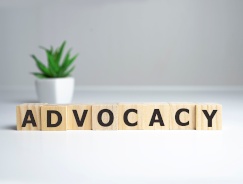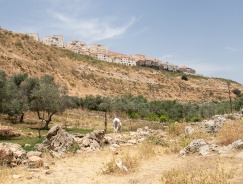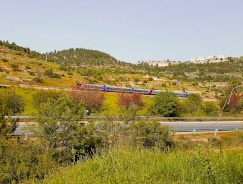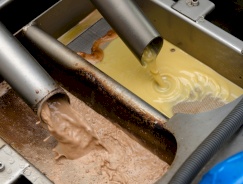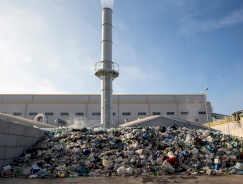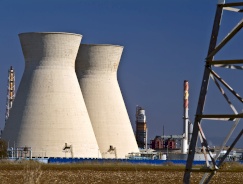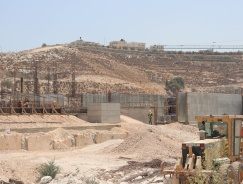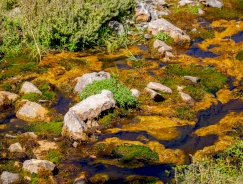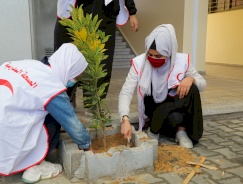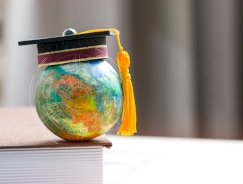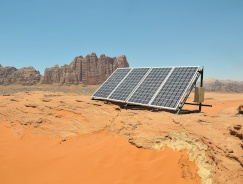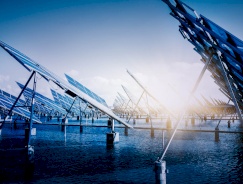The environment in the Gaza Strip faces formidable challenges due to the depletion of the limited natural resources and the over-15-year siege imposed on Gaza, without finding any final solutions to the crisis in sight. The water and wastewater are the foremost environmental problem on the coastline as 40 percent of the raw wastewater in the Gaza Strip is discarded into the Mediterranean Sea let alone the garbage littering up the shore.
An interview with Basil Yasin, a field coordinator with EcoPeace Middle East:
"The Wadi Gaza is considered the only waterway extending from the furthest point in the east and the furthest eastern border to the sea. However, regrettably, it is no longer a freshwater waterway as it is contaminated with wastewater discharge. On the one hand, residents in the surrounding area deliberately dump their untreated wastewater into this waterway due to the lack of sewerage networks. On the other hand, the water that used to flow in Wadi Gaza has remarkably decreased,, exacerbating the contamination of the Wadi."
As a linking bridge between the local communities and decision-makers, EcoPeace Middle East continues working with investors, governments, and the international community to focus on the issues of water, environment, increasing green spaces, and encouraging green entrepreneurship. In this vein, and through the Good Water Neighbors project, funded by the Swedish International Development Agency (Sida), EcoPeace Middle East has identified the challenges posed by climate change and the inequitable distribution of water by focusing on promoting awareness and education among the youth, as well as training the teachers in various environmental issues in line with 13 lesson plans tailored to the Palestinian curricula and combined with numerous field visits to various locations, such as Wadi Gaza.
Dr. Ahmad Abu Ismail, Director of the Development and Investment Unit in Abasan al-Kabira Municipality
Through the Good Water Neighbors project, many awareness promotion and water conservation projects have been carried. These projects targeted school children and various segments of the local community, including both genders; women and men. Besides, forestation projects have had a large impact on increasing greenery and making the town aesthetically appealing.
Anwar El-Helou, environment and earth science teacher:
"A group of colleagues and I received training through EcoPeace Middle East in the fields of water and environmental awareness in addition to the water situation in the region and the world. This training will help us raise our awareness about these issues and will equip us with environmental education so that we will be able to pass it on to our beloved schoolchildren. Then, the schoolchildren will gain knowledge of these environmental issues, and, subsequently, have a broader vision of the water situation in Palestine and the region. God willing, they will eventually become decision-makers in the future. "
Through the Good Water Neighbors project, EcoPeace Middle East makes a direct contribution to provide school children with the opportunity to understand and merge the issues related to their social environment through practical training. Thus, the project will become a tool that contributes to deepening regional integration and fostering the concept of equitable water allocation in line with the relevant international standards and laws.

 Advocacy Projects
Advocacy Projects Raw Sewage from Settlements into Wadi Fukin – Nahalin
Raw Sewage from Settlements into Wadi Fukin – Nahalin Industrial zone near Battir
Industrial zone near Battir Release of Olive Mill Waste to Rivers
Release of Olive Mill Waste to Rivers Mishor Adumim Waste to Energy Project
Mishor Adumim Waste to Energy Project Power Plant Near Qalqilia and Kfar Saba
Power Plant Near Qalqilia and Kfar Saba Wadi Samen Advocacy Efforts towards Industrial Waste and Waste Water
Wadi Samen Advocacy Efforts towards Industrial Waste and Waste Water Environmental pollution from slaughterhouses
Environmental pollution from slaughterhouses Youth&Young Professional Capacity Building
Youth&Young Professional Capacity Building Water and Energy Nexus
Water and Energy Nexus